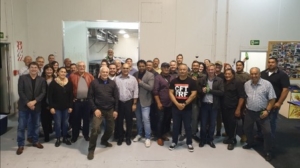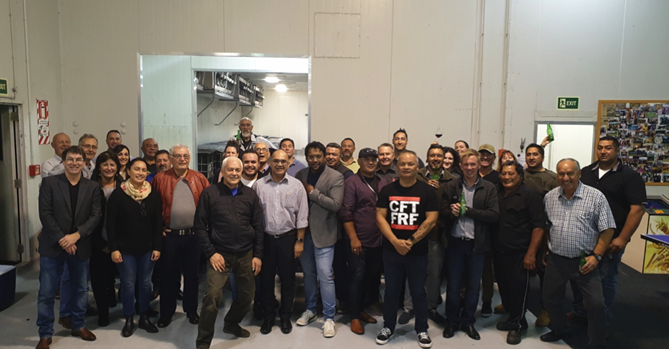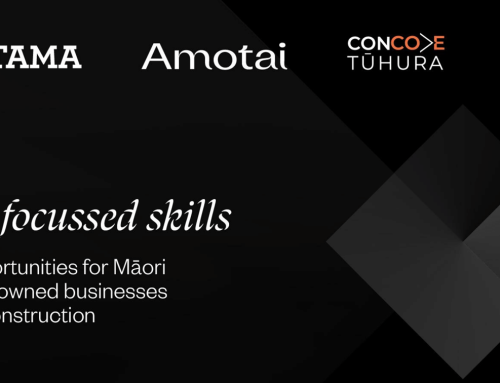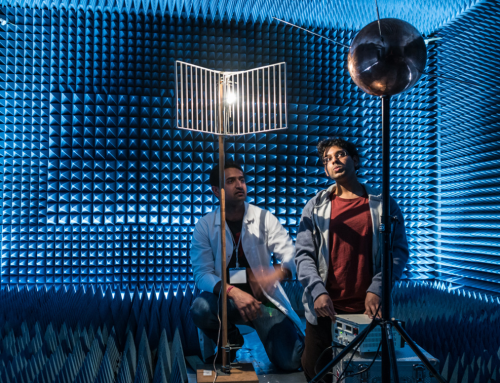Poutama Trust: Collaboration key to success for Māori businesses
Attending the Te Hono Stanford Bootcamp IV in 2015 confirmed what Poutama Trust CE Richard Jones had known about the benefits of collaboration.
“We were collaborating before bootcamp, but [going to bootcamp] helped validate that this was a good path for us to go down, simply because many of our businesses are small or not necessarily looking ahead too far into the future, so that’s what we’ve been able to help them do.”
Poutama is an independent charitable trust that was established in 1988 to provide business development services to Māori, and to promote Māori economic development. Over the years, Poutama has invested $28 million in over 3,200 Māori businesses.
Richard (Ngāti Maniapoto, Rangitāne o Tamaki nui a Rua, Ngāti Whakaue and Ngāti Pikiao) has led the trust for over 20 years.
“Collaborating enables businesses to go into areas they would have never been able to go individually – for example, the 11 businesses involved in Waiū Dairy wouldn’t have been able to build a dairy plant on their own,” he says.
“They can pool resources – the burden of cost isn’t on one business, it can be shared amongst all those businesses. They are also able to raise capital as a group – with Waiū we were able to get two-thirds of what we needed from within the group.”
“Collaborating also introduces expertise and ideas into the group.”


Waiū Dairy is one of Poutama’s first examples of kotahitanga (unity) – and potentially the most challenging one to develop, Richard says.
The dairy processing operation in Kawerau opened mid-2019, following the establishment of the group in 2013. Designed to utilise renewable energy and maximise technological advances, the plant has built in flexibility to produce a range of dairy products. These products will be produced from both conventional and organic dairy milk.
Waiū Dairy is a collaborative effort by 12 businesses – 11 of which are Māori businesses based in the Bay of Plenty. As well as being investors, some are also milk suppliers to the dairy plant. Together they hold 66.66 per cent shareholding in Waiū Dairy.
“Some of the things I learnt from bootcamp I was trying to apply, maybe even without realising it at times, just trying to bring these people together to do something different,” Richard says.
“When we first thought of the idea of the dairy plant, it was modelled on what Miraka had done, in that it was powered by geothermal, but we also wanted it to be multi species – so cow, sheep, goat – and focus on organic, in a staged way. We have the dairy going and we’re producing products. We’ve engaged with people in the goat and sheep industry as well, so hopefully that will come to fruition eventually.
“Everyone told us that building a dairy plant is a challenging thing and they very rarely go right, and it’s exactly what’s happened with Waiū – we’ve had a lot of challenges but it’s slowly turning a corner.
“Over the next year or two, our focus will be on consolidating the business, driving sales and building up our story in the international market.”
With the majority of Māori assets being in food, Richard says often business owners can be so focused on managing day to day that they aren’t peering into the future to see how emerging trends might impact their operation.
“Learning is a lifelong journey. Bootcamp helped open my mind even further. I’m pretty open minded anyway and always looking at what’s taking us into the future – but bootcamp helped to strengthen that learning and will be part of my journey forever.
“For Poutama, we never thought we’d be in the renewable energy sector, or looking at insects for protein, or helping a person with a technology app.
“It also increased my drive to create collaboration for Māori business because we’re kind of late to the game in terms of being in the value chain, there are some in the value chain but most probably aren’t.
“It’s no good just growing the crop all the time, you’ve got to move beyond that if you want to get greater value out of it or innovate.”
That innovation is starting to happen across the Māori sector now, particularly with food.
“More and more Māori organisations are starting to click into that now and I think that’s partly that people who have gone to bootcamp have taken these ideas back and are applying them.”

MiHI Rōpū
Another initiative driven by Poutama is the Movers in Hemp Innovation (MiHI) collaboration, which kicked off in 2018 after Waiū Dairy began considering a plant-based milk.
“I knew of a Māori business that was in the hemp sector, so we talked with them, but we didn’t know anyone growing hemp. So I looked into it further and I knew there were a couple of Māori businesses already in that sector, so there were people who had experience, information and knowledge.”
“I asked them if they wanted to come together to have a hui and throw some ideas around and see if we wanted to move this forward and most of them agreed they wanted to do this.”
“Everyone chucked in $10,000 and we had about $240,000 as a start-up fund to look into the industry.”
MiHI is now made up of 27 businesses of varying capacities and capabilities, ranging from hemp and cannabis growers and processors; land owners; food processors, distributors, marketers and exporters; farmers; investors; entrepreneurs; and research institutes.
“They have done a trial planting of hemp – and learned a few hard lessons,” Richard says.
“One was that the infrastructure for harvesting and processing isn’t established here in New Zealand. One contractor didn’t turn up and another didn’t turn up on time. It was difficult to get people to come in and harvest and then get the crop dried.
“We also discovered that birds like hemp seeds – one grower lost about a third of the crop to birds.”
With those lessons in mind, the group turned their attention to research. Having connections with the First Nations in Canada, MiHI decided to look at the North American market.
“We completed a market research and market regulatory exercise in May this year and that threw up some ideas for us around products. We have to come up with something unique because the market is pretty saturated with hemp and CBD type products.”
The research has led MiHI to focus on how the entire hemp plant can be used, for things like food, fibre and medicine.
“We’re looking at whether you can get all those things from one plant or have to grow specifically for those things.”
Working with the Riddet Institute, a premier national centre for fundamental and strategic scientific research in food, they created vanilla and chocolate ice cream from hemp. MiHI is also researching using hemp for building materials and blending hemp with wool for hi-tech wearable clothing.
“All of that is aimed at being able to go back to the group and say, yes it’s worthwhile you growing hemp and we’ve got products that it can be turned into and we’ve got markets that we can engage with.”
With MiHI well on its way to being established in its own right, Poutama will turn its attention to other collaborations that are starting out.

Tuku Wine Collective

Tū Mai Rā Energy solar installation at GHA, Rotorua
One is TUKU, the world’s first Māori winemakers collective, which includes six vineyards.
“The initial thinking with TUKU was that they could share resources, for example they could approach one bottle maker or label supplier. The next step might be that they collaborate on one brand.”
Stepping outside of the food industry, Poutama partnered with Tū Mai Rā Investments and Ice Solutions to launch Tū Mai Rā Solar Solutions in May 2019, opening a solar R&D facility in Gisborne. The new name is now Tū Mai Rā Energy as the group diversifies into other forms of energy such as combining solar with thermal storage for dairy milking sheds.
Tū Mai Rā Energy has already provided energy solutions for a commercial building, a marae and a school.
Looking to the future, Richard will be farewelling the Poutama Trust in March 2021, though he will stay with Poutama as an independent contractor from April until September 2021, to support a smooth transition to the new leadership.
In terms of what is on the horizon for the trust, Richard says they want to look at innovative ways of financing, whether that’s crowd funding or something else.
“It’s a challenge for any business, but that’s where I see collaborations come in as well. We proved it with Waiū – we raised $20 million within the group and got an offshore partner who brought in $10 million plus raised another $10 million.”
Richard’s advice to anyone preparing to attend the Te Hono Stanford Bootcamp is to be open to different ways of thinking, planning and looking into the future.






